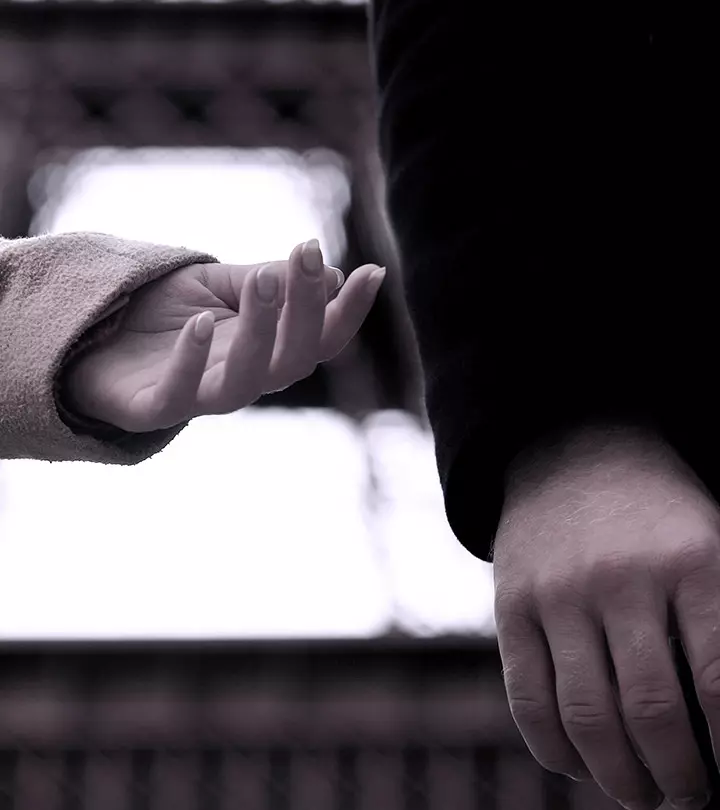

Image: iStock
Marriage is a beautiful relationship based on love, trust, and friendship. However, sometimes couples face problems due to issues, such as commitment issues, from either partner. Suddenly, the vows that you took on the wedding day seem like a group of plain words, which do not mean anything today. Partners who promised to share their life grow apart, and the trust that flourished once upon a time vanishes. It almost feels like the entire foundation of your marriage has been shaken to its core.

If you feel your partner is not committed and your marriage is a one-sided bond, this post will help you explore your relationship and rekindle the spark. Here, we tell you about marital commitment, situations that arise due to commitment issues of a partner, and ways to deal with them.
Why Do People Commit To Marriage?
A commitment is a promise that a couple makes to stay together through all the ups and downs of life. They could commit to being together for several reasons, the top ones being:
- Personal reasons: This is probably the highest level of commitment, which can make a difference in a relationship. When two individuals commit to each other for personal reasons, they stay in a relationship because they genuinely want to.
- Beliefs: This type of commitment arises from the beliefs and values of the individual. Despite having commitment issues, a person can still be in a relationship due to strong religious and moral beliefs. Couples or individuals under this commitment believe that staying in a relationship is the right thing to do.
- Society: In some cases, societal pressures, the fear of ending up alone, or the amount of time and effort invested in the relationship also can motivate people to stay in a relationship.
Marriage is a lifelong commitment, but does it mean that every married couple will have a committed relationship? Read on to know more.
Can Married Couples Have Commitment Issues?
Married people have commitment issues too. That’s because they probably entered wedlock due to the forceful circumstances or pressure from the partner, but without resolving their commitment issues.
If a person commits to a relationship without being ready for it, they will never be able to do justice to it. Their doubts and reservations might prevent them from going all in and loving their partner unconditionally.
So, if your partner seems to get jitters when you bring up ‘future’ or ‘planning’ (even after getting married), then chances are they have issues being committed. How do you know for sure?
Keep reading, and we’ll tell you about the signs that suggest that your partner may be commitment-phobic.
Signs Your Partner Could Have Commitment Issues
You might have entered the marriage all prepared, to give your all physically and mentally to your partner. But if your partner is not able to fulfill their promise to be your all, then it could be devastating.
Here are a few signs that may confirm your partner’s commitment issues.
- They are still not sure: Marriage is the epitome of commitment. But if your partner has commitment issues, then they will have reservations and doubts about the relationship. They give you mixed signals. For example, they shower you with unconditional love, and then may act like a total stranger. They rarely use the words ‘ I love you,’ and you may not feel like you are ‘the one’ in their life.
- Hesitates to connect with families: In a fully committed relationship, the partners would ideally be looking forward to spending time with each other’s families. But if your partner has commitment issues, they do not like spending time with your family. They might hesitate to interact or bond with them.
- They still have their shields up: When you truly love someone, you let your guard down with them. You have confidence that your partner would not judge you. But if your partner is cautious or walks on eggshells around you, then it could be because they are not committed to you.
- Future looks uncertain: You may have never really discussed the future with your partner. It could be because they never showed interest or they always avoided that topic. When do we have kids? Are we going to invest in a property together? There will be questions but no answers or even an acknowledgment from your partner.
A person who is genuinely committed to the relationship would be prepared to handle the ups and downs in a relationship. But if your partner has commitment issues, then they are likely to panic even if there is a slight disturbance. Words like “I didn’t sign up for this” or “I cannot handle you” become a norm.
- They have a wandering eye: A commitment-phobic person can never be content with you. If they believe that they have settled too early in life or have been pressured into marrying you, then maybe they were not ready for this relationship in the first place. That also makes it difficult for them to dedicate their life to you. So they could always be checking out other people, even when they know it is not right.
- It is always their way or the highway: If you are in a relationship with someone who is not committed to you, your needs will always come last. They would not make an effort, let alone go out of their way, to make you feel loved.
Your opinion about anything, from something as simple as choosing a restaurant for dinner to important decisions like where to buy a house, will not matter. They may even manipulate you into believing that their idea was yours, without you even realizing it, so that they can get their way.
- They are reluctant to the idea of having kids: Some couples choose not to have kids, and both the partners are clear about it right from the beginning. But if you do want kids and your partner always evades the topic or says they’re not ready for kids every time you bring it up, chances are they are not committed. Children bring lifelong responsibility and need dedication that they cannot offer.
These are a few prominent signs, but the most pressing sign is your screaming intuition. If you’re always telling yourself, “it’s going to be okay, things will change,’ then deep down, somewhere you know there’s a problem.
Eventually, you may also start doubting yourself, and wonder if you are not good enough, or if something is wrong with you. But, in most cases, it is not your fault. You gave your everything to the relationship. So, why is your partner not being able to commit? Or rather, why are they scared with the word ‘forever’?
Why Do People Have Commitment Issues?
Commitment issues can crop up at any stage of a relationship. Also, both married and unmarried couples can face commitment issues.
For some, getting intimate and committing to a person might sound simple and straightforward. But for others, it could be a big deal. A person could be scared of committing to a relationship for various reasons. Here are a few possible ones.
- If they grew up in a house where the parents had marital troubles or got divorced.
- When the person was subjected to neglect and abuse at a young age, it causes them to develop trust issues, and fear of getting close to anyone.
- Previous failed relationships, where the partner has cheated or abandoned them. Such hurtful experiences could also make them believe that getting into a relationship will ultimately lead to hurt.
- Misconceptions and fears that committed relationships suffocate and suck out personal freedom.
- Strong desire to be free-spirited and not willing to be tied down by responsibilities.
- Fear of choosing the wrong person or entering into an unsatisfactory relationship.
- Strong pressures on the marriage to be everything for both people/not enough outside resources, relationships, or community to help support the marriage.
No matter what the reason is, a person who has commitment issues need not necessarily bad. Your partner could truly love you, but still not be able to commit to you. They might be fighting an inner battle, unable to get over their fears and give you the love and support you truly deserve.
Signs Your Partner Is ‘The One’ Despite The Commitment Issues
Do you feel that your partner is ‘the one’ even though they have commitment issues? Then, here are a few signs that could back your intuition.
- You core values match: Sometimes, the commitment issues of one partner are apparent. But if there is strong friendship and good chemistry between you, then it is a sign that things will eventually work out. Also, if you have the same core values, then there is a strong possibility that your partner could be your ideal match.
- You notice they are trying: There are signs that your partner is trying to overcome their fears and commit to you. If they are willing to give up some of their freedom to accommodate you in their life, then in no time you will be able to experience the joys of being with a committed partner.
- You are sure it is not you: You are sure that your partner has commitment issues, and it has nothing to do with you. At least your partner is honest about their issues and does not make you feel like you’re at fault. In such a case, there are chances that in time, their fears can subside and they let go of the commitment issues.
- You both tried to quit but failed: No matter how many times you fight, and how many times you both thought you’d had enough and wanted to end it, you always find a way back together. Both of you just cannot get over each other. Then, it would be best to discuss and find a way to sort things out.
- They acknowledge your desire for commitment: Even though they are uncomfortable with commitment, they never ignored your need for it. This is a sign that your partner is conscious of your needs. It could be just that they are having a hard time taking a leap of faith. But, internally, they might be getting ready for it.
If you are sure of your feelings towards your partner, then with a few small steps, you can help them get over their fears and make them feel assured.
Ways To Help Your Partner Overcome Commitment Issues
All it takes is a little understanding, lots of patience, and a few baby steps for your partner to be ready for ‘forever’ with you.
- Understand the issue: You love this person with all your heart, but they are not able to give their one hundred percent probably because something is holding them back. The first step is to make your partner aware of the issue at hand. But be careful not to make it negative or demeaning for them. Remember that underneath the thick armor of insecurities, there is a person who probably loves you more than you do.
- Extend your love and support: Transformation is never easy. Your partner needs your love and support to come out of their shell. They might not be comfortable talking about it at first, but you need to be understanding and supportive. Eventually, they might open up. Also, never criticize them. Instead, assure them that you are there for them.
- Do not rush: Rushing a commitment-phobic person will only make things worse; if you love them and want a lasting relationship with them, then you have to have patience. They might be taking baby steps towards you. Try to identify them and appreciate them. For example, something as simple as putting you as their emergency contact can mean a big thing for your partner. But if they did it, appreciate it.
- Find balance: If your partner is someone who needs space, then there is nothing wrong in giving it to them. All you need to do is work out a plan that will allow you to have a committed relationship as well as personal space. Once you both could strike this balance, your life will become a lot easier.
- Take care of yourself: While trying to help your partner with their issues, do not neglect your happiness. Whenever you are feeling overwhelmed, take some time off, and take care of yourself. Do things that make you happy. Most people who are scared of commitment tend to be overly concerned with their feelings and ignore the fact that their behavior is affecting you.
- Be prepared for the worst: While it is good to give your partner a chance to commit, getting your hopes too high may not be the best idea. If they succeed, you could have a happy relationship. But there are chances that your partner might not be able to change either. As long as you are satisfied with the progress, continue your journey. But if you feel your partner is taking advantage and using your patience to get their way, then know that there is probably no future with them.
Frequently Asked Questions
1. How do I date someone with commitment issues?
Dating a person who has issues with committing to a relationship can be challenging and confusing because you lack clarity on how your romance will progress. However, you may be attracted to many good qualities in the individual and unwilling to let go of them. So, you may ask about relationship goals, give them space, help them open up about their fears and insecurities, and more importantly, give yourself a timeline, keeping your self-interests in mind.
2. Can a man with commitment issues change?
It is possible for a man with commitment issues to enter a relationship, provided they understand the bright side of romance and companionship. If the man is too precious and important to you, you can help him realize the beauty of having a companion and make them want to be in a relationship with you.
Being in a commitment is necessary for a relationship’s long-term survival. It provides security and peace of mind to the partners. So, if you’re thinking about marrying your partner but notice signs of commitment issues in them, such as concerns and worries, reluctance to connect with their family, or uncertain looks, reconsider your decision. Also, work as hard as possible to fix your relationship’s commitment concerns. If your partner is still hesitant to go all-in despite your attempts, do what you need to do for your happiness.
Key Pointers
- There could be personal reasons, beliefs, or societal causes that affect one’s commitment to a relationship.
- A person with commitment issues safeguards themselves and is uncertain of the future as a couple.
- If they are trying or understand you well, it could mean they are working on their issues.
Community Experiences
Join the conversation and become a part of our nurturing community! Share your stories, experiences, and insights to connect with fellow parents.
Read full bio of Avi Steinhardt
Read full bio of sanjana lagudu














